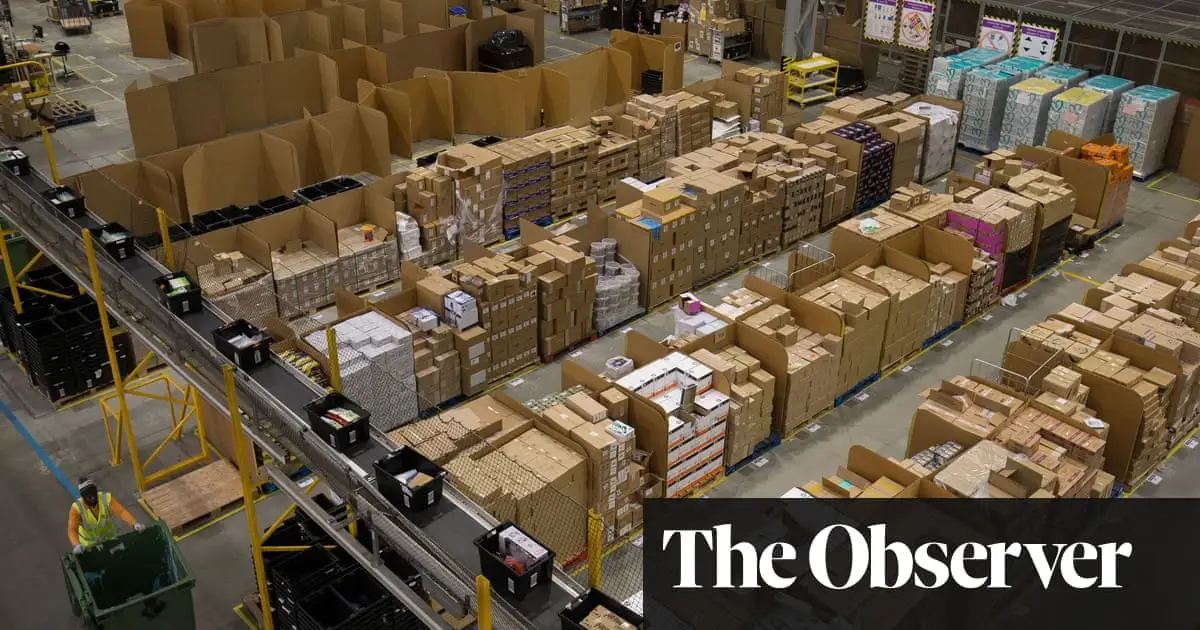- cross-posted to:
- unions@lemmy.ml
- unions@sh.itjust.works
- cross-posted to:
- unions@lemmy.ml
- unions@sh.itjust.works
Ambulances have been called out to Amazon warehouses more than 1,400 times in the past five years, the Observer can reveal. The figures, which were described as shocking by the GMB trade union, raise fresh questions about safety at the American giant’s UK workplaces.
Amazon centres in Dunfermline and Bristol had the most ambulance callouts in Britain, listing 161 and 125 across the period respectively.
A third of callouts by the Scottish Ambulance Service to the Amazon site in Dunfermline related to chest pains, with other callouts for convulsions, strokes and breathing problems recorded.
Ambulances have been called to Amazon Mansfield 84 times since 2019. More than 70% of those were for the most serious types of incidents – dubbed category 1 and 2, which can often relate to life-threatening conditions like heart attacks or strokes.
Attempted suicides or other serious psychiatric incidents were recorded at Amazon centres in Bolton, Chesterfield, Mansfield, Rugeley, London and many others.
Incidents related to pregnancies or miscarriages for workers on shift were also listed at several sites, as were traumatic injuries and suspected heart attacks. Other incidents included workers who were exposed to acids and hazardous gases, badly electrocuted or had severe burns over a significant part of their body.
…
Amanda Gearing, a GMB organiser involved in that effort, said the figures were “shocking, but not surprising” and called on local authorities and the Health and Safety Executive to investigate the company’s working practices. “Amazon workers are routinely pushed beyond the limits of human endurance,” she said. “They’re forced to work to a hidden target that isn’t based on safe working but on a Hunger Games algorithm.”
“Even these worryingly high figures might hide how commonplace injury and illness is at Amazon. We know from our members in Amazon warehouses that first-aiders are actively discouraged from ringing ambulances – instead told to take taxis,” she said.
The number of incidents being recorded at Amazon fulfilment centres and warehouses appears to be higher than the reported figures recorded for major fast fashion warehouses.
In a Vice investigation before the pandemic, warehouses for the likes of Boohoo, Missguided and Pretty Little Thing, described as “Victorian” by union officials, recorded 10 ambulance callouts or fewer a year.
In 2018, a freedom of information request from the GMB union found that a Tesco warehouse in Rugeley, near Birmingham, recorded only eight ambulance callouts in three years versus the 115 logged at a nearby Amazon site. Both warehouses employed large numbers of workers at the time – 1,300 at Tesco’s site and around 1,800 at Amazon’s.



It’s strange to me that people working there apparently have relatively frequent strokes. Am I underestimating how many strokes people doing difficult physical labor generally have (my impression was “not many”) or is there something uniquely dangerous about the Amazon warehouses?
It’s unclear and you’d need a lot more data to draw any kind of conclusions - not just the rate in the general population (for the age group) as well as those working similar jobs. It would be unusual to find a lot of strokes in working age people but a friend of mine had one at work.kn her late 40s (but she had a genetic predisposition - her father died at the same age from a heart attack).
The suggestion has been that the working conditions in Amazon factories is especially brutal because the packers are standing for such long periods of time with few breaks and have high targets they need to hit leading to considerable stress. The TUC have a page on working conditions at fulfilment centres.
It’s unfortunate that they missed out on Trade Union recognition at the Coventry facility recently. I’m sure GMD (or others) will keep on trying though.